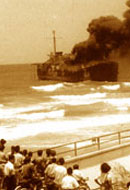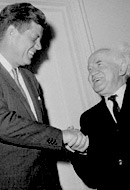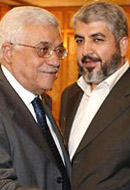Events
 In the Wake of the Altalena
In the Wake of the AltalenaThursday, June 30, 2011 by Elliot Jager | Jewish Ideas Daily » Daily Features
Ships and their comings and goings have lately been a fixation over at Haaretz, Israel's chief left-wing newspaper. One of the paper's advocacy journalists has been writing enthusiastically about joining up with a pro-Palestinian flotilla that intends to smash Israel's naval blockade of the Hamas-controlled Gaza Strip.
 The Osirak Precedent
The Osirak PrecedentThursday, June 23, 2011 by Aryeh Tepper | Jewish Ideas Daily » Daily Features
In May 1981, eight Israeli fighter jets were on the runway waiting for the go-ahead to execute the most daring operation ever undertaken by the Israeli air force: flying more than 1,000 miles east over enemy territory to destroy Osirak, Iraq's nuclear reactor.
 To Ransom or Not to Ransom?
To Ransom or Not to Ransom?Friday, June 10, 2011 by Aryeh Tepper | Jewish Ideas Daily » Daily Features
The PLO's first attack on Israel came when Mahmoud Hijazi and five other terrorists attempted to bomb a water-pump station in southern Israel. Once captured, Hijazi received the second death sentence ever handed down in Israel. Though his sentence was later overturned, the story was far from over.
 No Springtime for Palestinians?
No Springtime for Palestinians?Wednesday, May 25, 2011 by Sol Stern | Jewish Ideas Daily » Daily Features
In his May 19 speech celebrating the Arab Spring, President Obama expressed enthusiasm for the "movements for change" that have been unseating tyrants previously supported or tolerated by the United States. In language echoing that of his despised rival George W. Bush, he adopted as his own the idea of promoting democracy in the Middle East.
 What Would Ben-Gurion Do?
What Would Ben-Gurion Do?Thursday, May 19, 2011 by Elliot Jager | Jewish Ideas Daily » Daily Features
How would David Ben-Gurion handle himself if he were the one scheduled to meet Barack Obama on May 20 and address a joint session of the U.S. Congress a few days later? That hypothetical question has been aired frequently by Israelis in the run-up to Benjamin Netanyahu's pending appointments in Washington.
 Israel: The Miracle
Israel: The MiracleTuesday, May 10, 2011 by Paul Johnson | Jewish Ideas Daily » Daily Features
The state of Israel is the product of more than 4,000 years of Jewish history. "If you want to understand our country, read this!" said David Ben-Gurion on the first occasion I met him, in 1957. And he slapped the Bible. But the creation and survival of Israel are also very much a 20th-century phenomenon.
 Hamas-Fatah: Looking for the Red Lines
Hamas-Fatah: Looking for the Red LinesTuesday, May 3, 2011 by Yehudah Mirsky | Jewish Ideas Daily » Daily Features
Things can always get worse, and in the Middle East they usually will. That was made depressingly clear once again with the April 27 announcement in Cairo of a reconciliation agreement between the rival Palestinian organizations of Fatah and Hamas.
 The Fate of Muslim Moderates
The Fate of Muslim ModeratesMonday, March 21, 2011 by Elliot Jager | Jewish Ideas Daily » Daily Features
The recent uprisings in the Middle East seemed, at least at first, to send a reassuring signal to Western observers: not only did genuinely moderate Muslims exist, and not only were they capable of finding a political voice, but there was reason to hope that, given time to organize and grow in strength, they might succeed in winning out against the voices of repression and Islamist extremism.
 The Peace Plan Israel Needs
The Peace Plan Israel NeedsTuesday, March 15, 2011 by Elliot Jager | Jewish Ideas Daily » Daily Features
Israel's wobbly friends in Europe and the U.S. are renewing their pressure on Jerusalem to "do something" about the "unsustainable" stalemate in the "peace process." As German Chancellor Angela Merkel scolded Prime Minister Benjamin Netanyahu: "You haven't made a single step to advance peace."
 Beyond Tanks
Beyond TanksMonday, March 14, 2011 by Alex Joffe | Jewish Ideas Daily » Daily Features
Israel in the past has fought large-scale conventional wars in which infantry and tanks have squared off. It has also faced down terrorists who cross borders to blow up buses or hide themselves among civilians. The next wave is called hybrid warfare, blending (in the words of the military theorist Frank Hoffman) "the lethality of state conflict with the fanatical and protracted fervor of irregular warfare."
Editors' Picks
A Separate Peace Tamar Rotem, Haaretz. A Gur Hasid, who practices a strict sexual separation, will not walk with his wife on the street. He will not call her by name. To address her, he will knock on the table. Or hum.
Reading the Netanyahu Tea Leaves Zvika Krieger, Atlantic. Does the collapse of recent Israeli-Palestinian exploratory talks mask an increased flexibility in the Prime Minister's position on Israeli control of the Jordan Valley? The Atlantic is hopeful.
Barter in Bartaa Tali Heruti-Sover, Haaretz. Straddling the Green Line, the village of Bartaa has become a booming market town. Or, rather, the Palestinian half has.
Blurring the Issue Hadassah Levy, Torah Musings. Blurring or removing photographs of women might be understandable in the ultra-Orthodox world, but it should have no place in Modern Orthodoxy.
Assad in the Balance Daniel Freedman, Forbes. Of all Israel's neighbors, Syria has traditionally been the most hostile. But now that the Arab League has deserted him, President Assad might be open to rapprochement with Israel and the West.
Will Israel Attack Iran? Ronen Bergman, New York Times. Can Israel severely damage Iran's nuclear sites? Would a strike have international legitimacy? Is this the point of last resort? For the first time, at least some of Israel's leaders believe that the response to all of these questions is yes.
Courting China Jerusalem Post. Given its erstwhile alliance with the Arab nations and current support for Iran, China is not Israel's most likely partner. Yet economic ties between Israel and China have never been stronger.
Dividing the Waters Susan Hattis Rolef, Jerusalem Post. A new French report on water usage in the Jordan Valley allows political bias against Israel to mask the real challenges of water conservation facing every country in the region.
Cyberwar Eli Lake, Daily Beast. The Arab-Israeli conflict is normally fought with Katyusha rockets and Merkava tanks, but the conflict's latest weapon is a botnet.
After Tal Jerusalem Post. The "melting pot" ethos, which aimed to resocialize young soldiers, has been replaced by a softer, multicultural approach—as a result of which, more Haredim have been integrated into the IDF, and more are joining.

